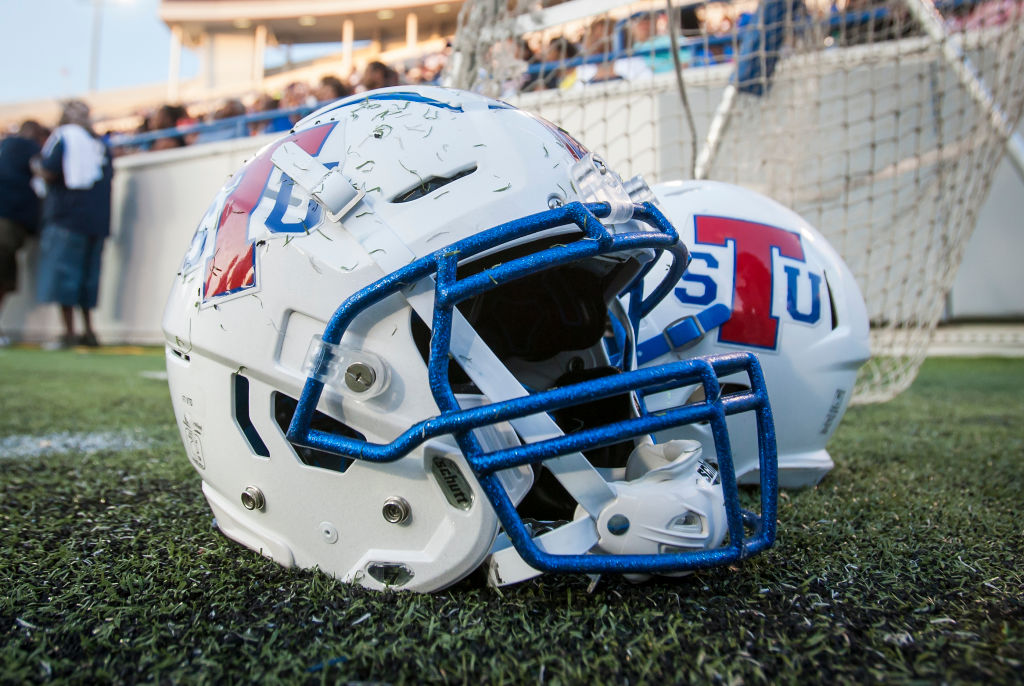Tennessee State vs. Notre Dame Spotlights ‘Payout Games’
TSU branded helmets are shown during the Southern Heritage Classic game between the Jackson State University Tigers and the Tennessee State Tigers on Sept. 14, 2019, at Liberty Bowl Memorial Stadium in Memphis. | Source: Icon Sportswire / Getty
Head coach Eddie George and his Tennessee State University Tigers will be making history next year when they become the first football team from a historically Black college or university (HBCU) to play against Notre Dame’s storied program.
The game will be nationally televised on NBC and provide great exposure for Tennessee State when the team travels to take on the Fighting Irish in South Bend, Indiana, on Sept. 2, 2023.
With football, in particular, all HBCUs play in the Football Championship Subdivision (FCS), which is considered a lower tier of competition, often resulting in lopsided losses from the “payout games.”
The announcement of the game earlier this week has drawn attention to the ongoing conversation about HBCU sports teams playing against typically mightier Power Five level competition in so-called “payout games” that offer generous financial compensation in return.
The game will also be the first time Notre Dame plays a team from the FCS.
The Charlotte Observer reported that Tennessee State Athletic Director Mikki Allen said the game is part of a larger strategy to increase the Nashville-based HBCU’s visibility on the national college sports landscape and make it more desirable for top recruits.
“TSU and Notre Dame are two iconic programs that have helped shape today’s college athletics landscape,” Allen said this week. “We are setting the foundation for long-term success under coach George’s leadership. The goal is that TSU will be a destination program for the next generation of student-athletes to come.”
Notre Dame Athletic Director Jack Swarbrick credited Allen and Coach George and even shouted out Tennessee State’s marching band “for a weekend that will feature programs with over 20 combined national titles.”
Former running back Eddie George of the Tennessee Titans watching from the sidelines during a game against the Buffalo Bills at Nissan Stadium on October 18, 2021, in Nashville, Tennessee. | Source: Wesley Hitt / Getty
But it was unclear just how much money Tennessee State was set to be paid for what is almost guaranteed to be a blowout victory for Notre Dame.
When reached for comment on Thursday, Tennessee State told NewsOne it was not at liberty to disclose the payment amount.
There are distinct advantages and disadvantages for HBCUs participating in these types of competitions.
Essentially, a “payout game” occurs when smaller programs like Tennessee State agree to play Power Five-Level opponents such as Clemson or Alabama in exchange for a significant monetary payment to the smaller school. The smaller program usually receives a large sum and the larger school receives a chance to get an “easy” win.
Based on multiple reports, HBCUs typically receive at least $300,000 to play in these games. But they can be much more lucrative.
For example, UCLA is set to pay Alabama State University $590,000 this year and North Carolina Central University $700,000 in 2023 for the HBCUs to come to Southern California and play.
However, sometimes “payout games” can backfire for the teams handing out checks.
Howard University was paid $600,000 by UNLV in 2017 for their participation in a game where the Bison would go on to beat the Running Rebels 43-40.
These games have produced significant revenue for not only HBCU programs but also for smaller predominately white institutions across the country. However, they usually come with a 30-point beatdown and national embarrassment.
The Tennessee State University Aristocrat of Bands performs during a game between the Tennessee Titans and the Buffalo Bills on October 6, 2019, at Nissan Stadium in Nashville, Tennessee. | Source: Icon Sportswire / Getty
Smaller schools must weigh the cost and reward of playing these games. Usually, the payout is significant enough to play a major role in funding the football program even if it means showing up just to take an L.
Yet, while the scores in most cases are lopsided, these games accomplish more than just a money grab— they also give the players at HBCUs a chance to compete in some of the largest venues in America and allow them to showcase their skills against some of the best players in the country, oftentimes on national television. Many former HBCU players who were already on NFL scouts’ radars were able to increase their draft stock with good performances against these big-time schools.
George told The Tennessean that the chance for his Tigers to play such a game was too good to pass up.
“When I got wind we were playing Notre Dame I was like, ‘Oh my gosh,’” George said Wednesday. “But when I really thought about our kids getting to come here and play on a national stage and show the nation what Tennessee State is all about holistically with our pageantry, our tradition, and our rich history not just in football but as a university, I realized it was a wonderful opportunity.”
While George may be on board, others in the HBCU community think the money and exposure aren’t worth it. Jackson State Head Coach Deion Sanders said in December that those games are the “ultimate sell-out to the children.”
Whatever your thoughts on these payout games may be, one thing is clear: The conversation around opportunities for HBCUs is complex, especially when those opportunities exist in traditionally white spaces.
SEE ALSO:
March Madness Money: Are HBCUs Treated Fairly During The NCAA Tournament?
HBCU Backlash Forces Art Briles To Resign From Grambling State Football Job

